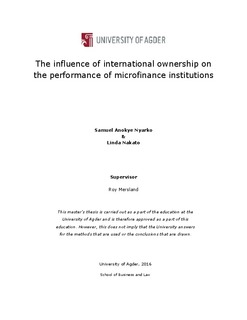| dc.description.abstract | The microfinance industry is experiencing rapid growth and financing this growth is a legitimate concern. During the past decade, international commercial funding in the form of international equity and debt has played a remarkable role in this regard. Until now, microfinance research that focus on the performance implications of international funding of MFIs is inadequate even though microfinance literature is voluminous. Our study focuses on the presence of international shareholders in microfinance institutions. Using data from 148 Microfinance Institutions (MFIs) in 51 countries, we empirically determine MFI characteristics that relate to presence of international shareholders. We also investigate the influence of international shareholders on the overall financial performance of MFIs and operating cost. We find that 53% of MFIs that are shareholder owned have international shareholders. This reiterates that there is a growing international equity funding for MFIs and that international equity is playing a remarkable role in financing the rising growth of the microfinance industry. Concerning the characteristics of MFIs, we find that shareholder MFIs that have international shareholders have high international orientation. Also, these MFIs often use village banking lending methodology, have higher outreach in terms of number of credit clients and usually serve urban markets. Regarding financial performance, we find that MFIs that have international shareholders are less profitable and less efficient in terms of ROE and ratio of cost to income respectively. We therefore conclude that the presence of international shareholders has a negative influence on overall financial performance of MFIs. In addition, MFIs that have international shareholders have higher operating cost profiles in the form of administrative and personnel costs. These findings are robust and as well, they are empirically and theoretically supported. The findings should however be generalized with caution. This is because, as literature suggests, performance improvements that result from having international shareholders may take time to realize and as well operating costs may be low in later years due to learning effects.
Key words: Internationalization, microfinance institutions, international shareholder, performance | nb_NO |
